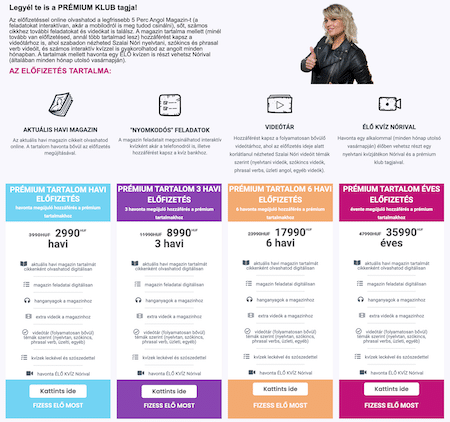Szia,
Remélem kellemesen telt a hétvégéd! Nekem nem annyira, sajnos egy kanyarban kicsúsztam az autóval az esőben, és nekimentem egy kőfalnak … “szerencsére” csak az autónak lett baja, ami most azért elég sok fejfájást fog okozni. Mindenesetre leckét természetesen most is hoztam neked, a héten a 14. évadból hozok érdekes leckéket (amely most akciósan megvásárolható csomagban is: itt)
Ugye tudod, hogy az 5 Perc Angol Magazint nemcsak nyomtatott formában, hanem online is olvashatod? Nézd csak!
Csatlakozz a prémium klubhoz, ahol a tagságoddal hozzáférést kapsz szinte az összes komplett tanfolyami videóhoz (letöltések és feladatok nélkül – “on demand” jelleggel – tehát megnézheted téma szerint a komplett videókat nyelvtan, szókincs, üzleti angol, nyelvvizsga és még sok más témában bárhol és bármennyiszer, míg az előfizetésed tart – közkívánatra hamarosan a kezdő olaszos videók is bekerülnek majd). A videók mellett hozzáférést kapsz az aktuális magazin cikkeihez is – amelyeket online olvashatsz -, sőt 2023 februárig visszamenőleg is (most több, mint 400 komplett lecke szószedettel, feladattal, videóval – de havonta bővül kb 50 új leckével).
Többféle előfizetés közül választhatsz: 1 havi, 3 havi, 6 havi és 12 havi. Nézd csak!


Ha pedig nyomtatva szereted olvasni, akkor az éves előfizetés most extra akciósan kapható, ajándék digitális (pdf) előfizetéssel (hozzáféréssel 2012-ig a teljes magazin archívumhoz)!
… és akkor jöjjön is a mai lecke!
Üdv,
Nóri
MAI LECKE
TOP 10 – The top 10 technologies that have changed the world

MEGNÉZEM A SZÓSZEDETET ÉS A VIDEÓT: ITT
Technologies have always been instrumental in shaping the course of human history. From the invention of the wheel to the creation of the Internet, new technologies have brought about significant changes in the way we live, work, and communicate.
The wheel
The wheel is one of the oldest and simplest technologies, but it has had a profound impact on human history. The invention of the wheel made transportation much easier and allowed people to move goods and materials over long distances. This paved the way for the development of trade, commerce, and transportation, which have been instrumental in shaping human civilization.
Electricity
Electricity was first discovered in the late 18th century. Since then, electricity has been a transformative force in the world, powering countless devices and enabling new technologies to be developed. Electricity has changed the world by enabling us to power our homes and businesses, communicate over long distances, move people and goods around the world, and access information and entertainment on a massive scale. Electricity has transformed the world in many ways, making our lives easier, more productive, and more connected.
The lightbulb
The lightbulb was invented by Thomas Edison in 1879 and was a major milestone in the history of electricity. The lightbulb provided a convenient, safe, and cost-effective source of light that has allowed people to live, work, and play after dark. The invention of the lightbulb also led to a revolution in the way people lived, as it allowed people to work longer hours, read after dark, and socialize in the evenings. Today, the lightbulb remains an essential part of our lives, and its impact on the world continues to be felt.
The telegraph
The telegraph, invented in the 19th century, revolutionized communication by allowing messages to be sent over long distances at great speed. This allowed for the rapid exchange of information and ideas and opened the way for the development of other forms of communication, such as the telephone and the Internet. The telegraph had a serious impact on the world, helping people feel a sense of connectedness.
The automobile
The invention of the automobile in the late 19th century created significant changes in transportation and society. The ability to travel great distances quickly and easily transformed the way people lived, worked, and travelled, and led to the growth of suburbs, highways, and other forms of infrastructure. The automobile has had a deep impact on the world, shaping our economy, culture, and society.

Television
Television was first demonstrated in the late 1920s and has since become one of the most popular forms of media in the world. Television has changed the world by providing a way for people to access news, entertainment, and information from around the world in real-time. It has also helped to bring people closer together by allowing them to share experiences and perspectives.
The advent of colour television in the 1950s was a major milestone that increased the popularity of the medium. The widespread use of cable television in the 1980s and 1990s opened up a vast array of programming options for viewers. The introduction of digital television in the late 1990s allowed for higher-quality broadcasts and a wider range of programming.
Television has also had a significant impact on the way people consume news. The ability to broadcast live events has revolutionized the way people receive information about the world. Television news has become an important source of information for people all over the world.
The computer
The invention of the computer in the 20th century has had a great impact on the world. Computers have revolutionized business, science, and society, allowing us to process, store, and communicate information at a speed and scale never before possible. The computer has also played a major role in the development of the Internet, which has bonded people and made information and knowledge more accessible.
The Internet
The Internet is one of the most transformative technologies of all time and has changed the world in countless ways. It was created in the 1960s as a way for researchers and scientists to share information. Since then, the Internet has grown rapidly, becoming an integral part of modern life. The Internet has changed the world by providing access to information, connecting people from around the world, and enabling new forms of commerce, communication, and entertainment. It has made the world a smaller place and has allowed people to connect and collaborate in new and exciting ways. The Internet continues to evolve and change, and its impact on the world will only continue to grow in the years to come.
Smartphones
Smartphones were first introduced in the early 2000s and have since become one of the most important technological innovations of all time. Smartphones have provided people with a portable, multi-functional device that allows them to stay connected and access information and services from anywhere. Smartphones have made it possible for people to communicate with each other, access the Internet, take photos and videos, and play games, among other things. The impact of smartphones on the world has been intense, and they will continue to play a critical role in shaping the future.
Artificial Intelligence (AI)
Artificial Intelligence (AI) has been a topic of interest and research for decades but has only recently become a practical technology that is changing the world. AI has the potential to revolutionize many industries and has already begun to impact the way people live, work, shop and communicate. From self-driving cars to intelligent personal assistants, AI is transforming the world in many ways. AI has the potential to solve some of the world’s most pressing problems, such as climate change and poverty, and to enhance our lives in countless ways. As AI continues to evolve, its impact on the world will only continue to grow, and its potential to change the world is virtually limitless.



